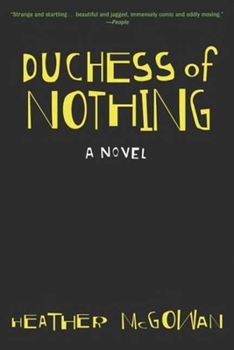Duchess of Nothing
Select Format
Select Condition 
Book Overview
After leaving her husband and her suffocating marriage for the romance and promise of Rome, the narrator of Duchess of Nothing has her freedom but is still trapped by the routine of life and haunted... This description may be from another edition of this product.
Format:Paperback
Language:English
ISBN:1596910674
ISBN13:9781596910676
Release Date:March 2007
Publisher:Bloomsbury Publishing PLC
Length:216 Pages
Weight:0.50 lbs.
Dimensions:0.6" x 5.5" x 8.2"
Customer Reviews
2 ratings
Brilliant
Published by Thriftbooks.com User , 18 years ago
I loved this novel. The voice of the narrarator was intoxicating, quite funny, and mercilessly dark. I laughed out loud a few times, but nervously. I found myself even liking the woman who was speaking and then shortly thereafter being appalled that I thought she might actually be likable or even sane. Complications like these that set up a conflict in the reader make for a reading experience that is a genuinely complex and prickly one. I think the closest comparison I can make to reading The Duchess of Nothing would be to reading the best of Thomas Bernhard's novels that are similarly inspired obsessive monologues bordering on insanity (the good kind). Both of Heather McGowan's novels (*Schooling* --her first-- also brilliant and troubling) will sit next to all of Mr. Bernhard's on my shelves. Highly recommended.
"I am not attached to anything, the world is a great vast place"
Published by Thriftbooks.com User , 18 years ago
The unnamed narrator of Heather McGowan's individualist novel Duchess of Nothing is haunted by her past and seems to ache for some kind of attention. As the novel opens, the "Duchess" of the title is living in an apartment in Rome, with her lover Edmund and Edmund's seven-year-old younger brother. She spends her days drifting lazily throughout her residence in a type of existential torment, talking to Edmund's younger brother, promising to unconventionally educate him and perhaps show him around the City. Her ambiguous relationship with Edmund - a less than intelligent artist - is at once self-evident; at one stage, she even contemplates leaving him. But it is Edmund that eventually departs, telling her that he is off to visit his mother. He leaves enough money for her take care of his brother for a few weeks, even though it is clear that she is not the best guardian - she feeds the boy by boiling bowls of milk in the morning and "mushy brown things that soak up lots of sources," at night and in one instance, even gives him scotch to dull the pain from a splinter. As long as she is responsible for Edmund's brother's education, the boy will know the truth about things, however dark the truth may be. As she chain-smokes, she begins to tell him of a time when life held great promise for her. She once worked as a bank-teller, where one spring day her husband walked into the bank "in a small felt cap," and chose her because he thought she was the best of the bank tellers. He withdrew her - just like the cash - and bought her to a compound on a distant hill where he methodically began to drive her mad. Of course, it was a terrible mistake, yet she refuses to take the blame for their failure as a couple, "he married me and I began to decompose; and at the wedding she predicted the whole affair would end horribly." Stultified and dying, she forced herself to make a break for it and head to the Alps. As she steadily reviews her life and the events that bought her to a piazza in Rome, "with a strange boy who spends hours building cities on the carpet," the author begins to paint a compelling portrait of a sad, bitter and emotionally dependent woman who is constantly living on the edge. Although she feigns control, it is actually Edmund's brother who is the more sensible - he wants to spend their remaining money on milk and bread, but she wants to splurge on a glamorous hat. They argue and bicker, and she lectures him about the perils of love, life and the universe, and although there is some resentment, it is clear that they have connected on a deeper level. To him, she can often be an "ugly yellow soul," to her; he's a short man in boys' sandals, "a comrade in the deliberation of our journey together in life." The Duchess of Nothing is a difficult book, the story told in an endless stream-of consciousness style, a type of expressive and dark interior confessional that is at once, funny and sorrowful. The prose is fluid and lyrical, with McG






